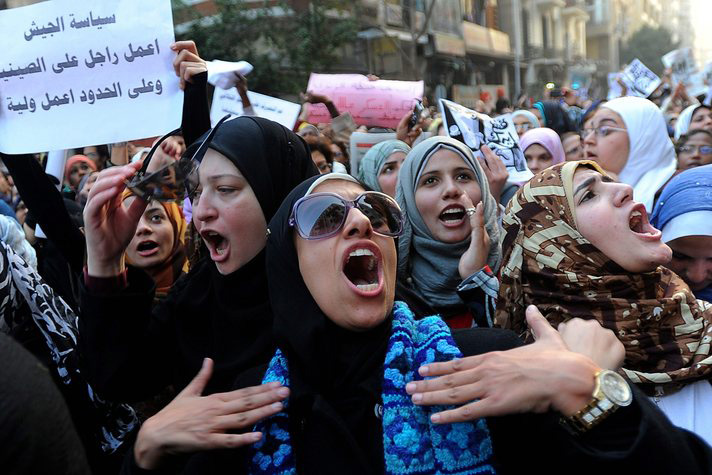
With a draft of the Rights and Freedoms chapter in Egypt’s constitution published last week, rights groups and political movements have expressed concern over the limitations the new constitution may impose on Egyptian citizens, particularly its women. One of their main concerns is the vague and ambiguous wording that plagues the draft constitution, an ambiguity which could easily be manipulated to serve specific purposes.
The Arab Network for Human Rights Information (ANHRI) published a response to the draft articles, and in it, commended the addition of articles that guarantee economic and social rights that were ignored in Egypt’s previous constitutions. ANHRI did however express concern over other aspects in the draft saying that in some cases the wording would actually allow authorities to restrict rights and criticized what it described as “clear” Islamist leanings. As far as women’s rights are concerned, the changes made seem cosmetic at best, and detrimental at their worst.
Women’s rights have been a hot button issue since the Constituent Assembly began its work, particularly in regard to Article 29 which prohibits the forced labor, slavery and trafficking of women and children, all of which are criminalized by the sex trade law. Article 29 has made headlines with conservative Salafi members of the Constituent Assembly calling for it to be removed entirely on the pretext that it “undermines modesty.” Despite these vocal calls, pressure to remove the clause has been largely ignored.
In the far more contentious Article 36, which addresses women’s rights and equality, little has changed in comparison to the 1971 Constitution. The clause reads: “The state is committed to taking all constitutional and executive measures to ensure equality of women with men in all walks of political, cultural, economic and social life, without violation of the rules of Islamic jurisprudence."
The article’s 1971 predecessors reads: "The State shall guarantee harmonization between the duties of woman towards the family and her work in the society, ensuring her equal status with man in fields of political, social, cultural and economic life without violation of the rules of Islamic jurisprudence.”
The main cause for concern comes from the ambiguous final sentence which remains the same, and which several secular political movements have decried, saying that the wording “endangers the democracy that everyone aspired for and sacrificed for.”
Additionally, while the new clause places the responsibility of women’s rights in the hands of the state, women are still in exactly the same position as they were with the 1971 constitution, not only because of the adherence to Islamic law, but also since it says that the state will guarantee women’s rights, while giving no details on how the it will set about to do so.
The new article, which has been described as inconsistent with international covenants and agreements that Egypt signed, is open to interpretation and with various Islamic schools of thought, could easily result in a lack of equality for Egypt’s women.
A statement signed by various political parties, unions, feminist groups and public figures in Egypt reads:
“We affirm that we do not object to God’s laws or to the provisions of the Islamic Sharia. However, we object to this clause because the lack of consensus among Muslim scholars on a unified interpretation of Sharia law opens the door for multiple interpretations, some of which could curtail civil rights and liberties.”
The ANHRI statement adds that without specifying actual areas of restriction, the wording once again opens the door to manipulation, and could also potentially have an adverse effect on non-Muslims who could be deprived of their rights “in accordance with a law they do not believe in.”
The constitution is the very first step in giving women’s rights in Egypt a real foundation upon which to build. The Center for Egyptian Women Legal Assistance (CEWLA) recently published a short video showcasing what women are anticipating from Egypt’s constitution, with several of them decrying the utter lack of representation in the drafting assembly. Many issues that were raised by these women appear to have had no place in the Constituent Assembly’s discussions, with activist Manal al-Tibi withdrawing from what she described as an Islamist-dominated process.
Boycotts, protests and petitions have done little to alter the course of the draft constitution, with religion a complex and integral part of much of the conflict. Women’s rights will always be embroiled in that discussion, as it becomes near impossible to separate the two. Unless inroads are made toward a truly secular constitution, or at least toward an explicit definition of Islamic law, equality for women will continue to be one of the many casualties along the way.
Nancy Messieh is the associate director of the Atlantic Council’s Rafik Hariri Center for the Middle East and editor of EgyptSource, a blog following Egypt’s transition.
Photo Credit: EPA
Image: misir-women-army-protest5.jpg
